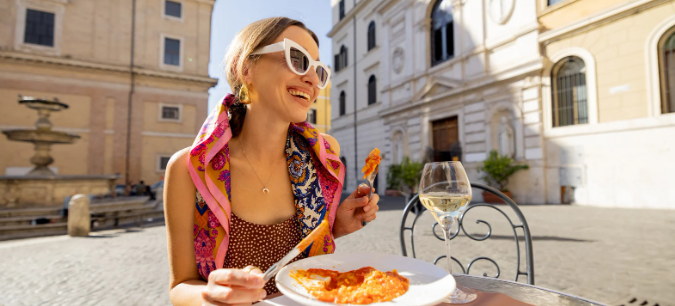American who left the country for just 2 weeks shares why life in the U.S. made her feel sick
After leaving the country, she saw the truth.
An American in Italy.
As the old saying goes, you are what you eat, so our diets play a tremendous role in how we feel from day to day. Food can give us energy, vitality, and mental clarity or make us feel listless and drained. A person who spent two weeks in Italy shared an incredible revelation they had while living in the Bel Paese. Even though they ate healthily while living in America, they felt great after spending a few days in Italy.
The traveler felt so much better living the Italian lifestyle that they pledged to leave America one day, possibly in five years, and move to Italy. They felt so much better abroad because Italians are much more conscious about their food quality.

“I'm just so mad at the food in the US. I left for 2 weeks to Italy. My mood was better, my awareness was better. I could eat wheat (I'm extremely gluten intolerant and it messes with my autoimmune disease if I eat it among a multitude of other symptoms) with gluten pills with minor bloating,” they wrote on Reddit. “I had some of the best food, best health feelings (other than muscle soreness from walking so much) I've ever had in my life. It's made me have so much resentment for US food. I mean, even my skin cleared up quite a bit overseas.”
American food has a lot of sugar
The big realization they had is that American food is loaded with sugar. “It just makes me so mad that having any kind of sugar is just too much here. Sugar and wheat and what ever else is just so much harder on my body here than in Italy. I want to move,” they wrote.

It’s easy to criticize the traveler by saying, “Well, why don’t you just eat differently when you return home to America?” But it can be tough to eat healthy in America because it's nearly impossible to escape the food system. “There is sugar in f**king everything. It's so bad,” one of the top commenters wrote. “I've pretty much stopped eating anything that isn't home-cooked using whole foods. Even all the bread products I consume are baked at home. Everything from bagels to dinner rolls.”
How do Americans and Italians eat differently?
The attitude towards food in Italy and the United States couldn’t be more different. First, both cultures treat shopping completely differently. Americans go to large grocery stores where a lot of the food is processed and the produce is available, whether in season or not. Italians prefer to go to small markets for fresh meats and produce, and only eat the foods in season.

Further, the Italian government has much stricter rules about food consumption. Italy is one of the top food producers in the European Union, and the government has banned GMOs for commercial use.
The Italian diet is healthier because it skips processed foods, added sugars, and refined carbs. Instead, it follows the Mediterranean approach, which supports heart health, better sleep, weight control, and mental well-being, while also reducing the risk of cancer and diabetes.
On a deeper level, Italian people place a high value on food, and meal time isn’t something to be rushed but a time to enjoy a multi-course meal with friends and family. Americans have an on-the-go lifestyle, where meal time is what we fit in between working and relaxing in front of the TV. So, if Americans took a page and put food back in the center of their lives, it may help with their mental, physical, and social well-being.
- The world just learned what Swedish people put on their tacos, and it just ain't right ›
- Sorry Italian food lovers. America is about to have a new favorite ethnic food. ›
- The 'Sioux Chef' works to return indigenous food to the forefront of the American diet ›
- Woman who moved from Ireland to Boston shares why the American dream is "all a lie." - Upworthy ›
- People from around the globe share 15 signs that someone is obviously an American - Upworthy ›
- Americans share the stereotypical foods non-Americans think they eat in gobs, but never really do - Upworthy ›

